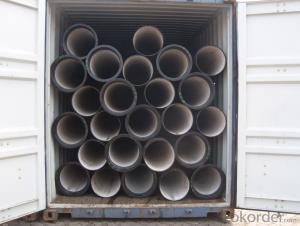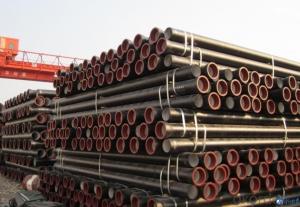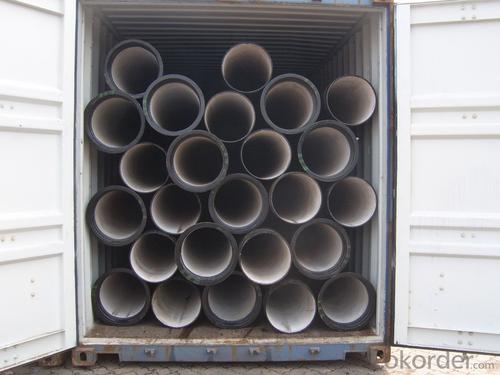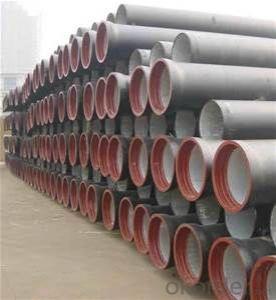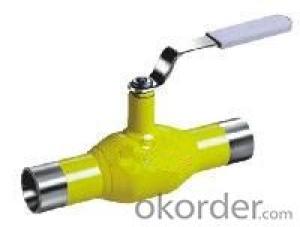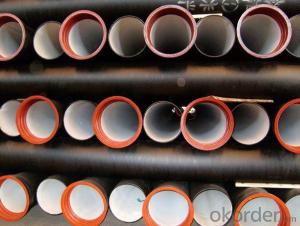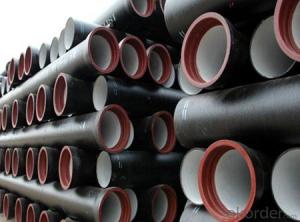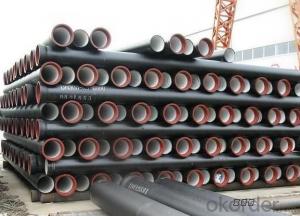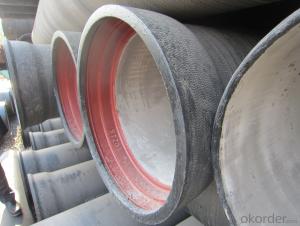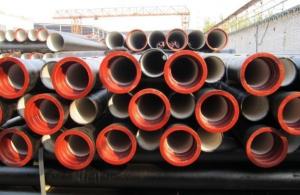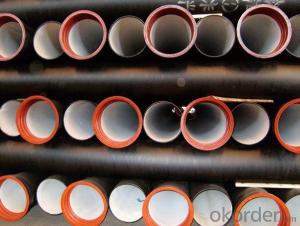Ductile Iron Pipe Professional Manufacturer On Sale DN500 EN545/EN598/ISO2531
- Loading Port:
- China main port
- Payment Terms:
- TT or LC
- Min Order Qty:
- 25 m.t.
- Supply Capability:
- 200000 m.t./month
OKorder Service Pledge
OKorder Financial Service
You Might Also Like
1,Ductile Iron Pipe Description :
DI pipe fittings are manufactured according to ISO 2531 or BS EN545 or BS4772 FOR POTABLE WATER ,internal is cement lining or wet epoxy coating;External is zinc plus bitumen or wet epoxy coating. We also manufacture ductile iron fittings with fusion bonded epoxy both inside and outside. All the producets are sutible to water pipes fields.We have passed ISO9001,ISO14001,OHSMS18001 certificate.
2,Main Features of the Ductile Iron Pipe:
1).Quality guarantee
• Chemical checking
• NDE after rough machining
• Mechanical testing after heat treatment
• Final NDE,dimension inspected
2).Quality document
• Full Q.A document as per client request
3).Packing and Shipping
• standard export package(carton/wooden case/pallet)
• accept FOB,FAS,CNF,CIF door to door etc or customer designated shipping agent
4).Service
• Drawing: we can translate your original drawing, offer best suggestion on design
• Quality: we have full set quality control system to guarantee the best quality.
• Inspection: inspect in house, all our products must be checked 3 times before packing
3,Ductile Iron Pipe Images:
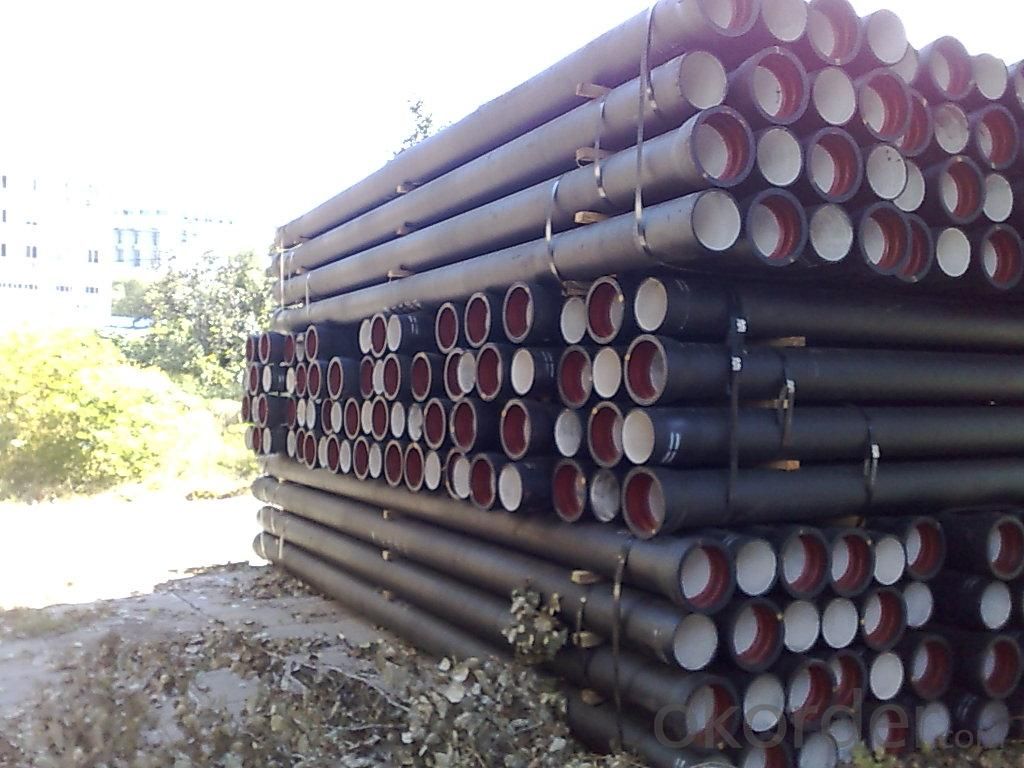
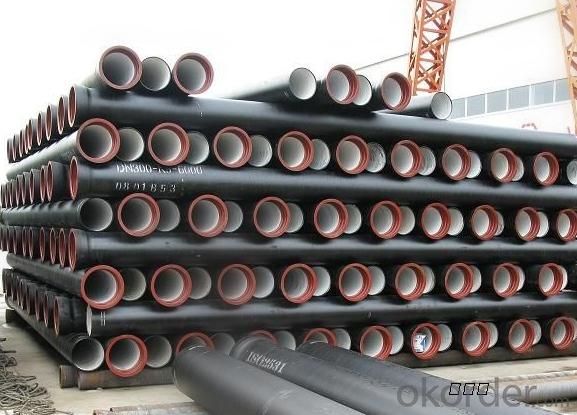
4. Ductile Iron Pipe Specification:
Internal lining: ductile iron pipes shall have an internal cement mortar lining in acc with ISO4179.
External coating: ductile iron pipes shall be externally coated with metallic zinc spray plus a further layer of resin
painting to ISO8179.
Gasket: 100% SBR/NBR/EPDM rubber gasket in accordance with ISO4633.
Packing: ductile iron pipes from DN100 to DN300 be bundled with steel belts, others are in bulk.
Payment term: L/C, T/T.
5.FAQ:
We have organized several common questions for our clients,may help you sincerely:
1.Q: Why would you choose ductile iron pipe rather than other pipe materials?
A:The reasons are obvious for that not only ductile iron pipe possesses the inherent strength and flexibility of ductile iron, combined with proven corrosion protection systems, but also the cost savings can be achieved from design to installation and commissioning.
2.Q:Why can you guarantee the inner of pipes can’t be corroded?
A: High alumina cement mortar lining and sulphate-resistant cement mortar lining. These two special linings are applicable to inner anti-corrosion for sewage pipes, improving resistance to erosion of the sewage components.
- Q: Are ductile iron pipes resistant to soil movement?
- Yes, ductile iron pipes are generally resistant to soil movement due to their high tensile strength and flexibility. They can withstand ground settlement, soil shifting, and other forms of soil movement without experiencing significant damage or failure.
- Q: Can ductile iron pipes be used for water distribution networks?
- Yes, ductile iron pipes can be used for water distribution networks. Ductile iron pipes are highly durable, corrosion-resistant, and have a long lifespan, making them suitable for transporting water over long distances. Additionally, their flexible nature allows them to withstand ground movement and vibrations, making them a reliable choice for water distribution networks.
- Q: Principles for the antiseptic treatment of ductile iron pipes
- The principle that the antiseptic treatment of ductile iron pipes must be complied with is that.1. internal and external surface coating shall be kept clean, remove rust and impurities2. after coating on the inside and outside surface, the coating should be even and smooth, firm and firm, and shall not be abnormal because of climate change3. coating for water delivery should be insoluble in water, no peculiar smell, harmful impurities content
- Q: What are the different methods for tapping ductile iron pipe?
- There are several methods for tapping ductile iron pipe, including hot tapping, mechanical tapping, and electrofusion tapping. Hot tapping involves drilling into the pipe while it is still in service and creating a connection without interrupting the flow. Mechanical tapping uses mechanical equipment to create a threaded or grooved connection on the pipe. Electrofusion tapping uses an electrofusion saddle to create a connection by fusing a fitting onto the pipe.
- Q: How do ductile iron pipes handle thermal cycling in industrial applications?
- Ductile iron pipes are renowned for their exceptional ability to withstand thermal cycling in industrial applications. Thermal cycling refers to the fluctuation in temperature that occurs during the operation of various industrial processes. These pipes are designed to endure the stresses caused by thermal expansion and contraction, thus making them highly suitable for environments with significant temperature variations. One of the noteworthy features of ductile iron pipes is their remarkable thermal conductivity. This means that they efficiently dissipate heat from the hot areas, thereby minimizing the impact of thermal cycling. Furthermore, ductile iron pipes have a low coefficient of thermal expansion, which means that they expand and contract at a slower rate compared to other materials. This characteristic helps to reduce the stresses imposed on the pipes during thermal cycling. Moreover, ductile iron pipes exhibit excellent mechanical properties, including high tensile strength and impact resistance. These properties enable the pipes to withstand the mechanical stresses that may arise due to thermal cycling. They can resist the development of cracks or fractures, ensuring the integrity and durability of the pipes in industrial applications. Additionally, ductile iron pipes possess a high resistance to corrosion and oxidation. This is particularly crucial in industrial settings where the pipes may be exposed to aggressive chemicals or harsh environments. The corrosion resistance of ductile iron pipes ensures that they can endure the corrosive effects of process fluids and gases, even during thermal cycling. In conclusion, ductile iron pipes are well-equipped to handle thermal cycling in industrial applications. Their high thermal conductivity, low coefficient of thermal expansion, excellent mechanical properties, and resistance to corrosion make them a reliable choice for environments with significant temperature variations. These pipes effectively withstand the stresses caused by thermal cycling, guaranteeing their durability and longevity in industrial settings.
- Q: How to correctly measure ductile iron pipe
- Ductile pipe diameter is around the tube around the peripheral measurement, use tools to gauge the inner diameter of the pipe, the length of the pipe is used to measure the ruler or tape, ductile iron pipe wall thickness can be measured directly, may also be a suitable tool for indirect measurement, the general profession will experience with project measure tube the size.
- Q: Can ductile iron pipes be used for railway crossings?
- Yes, ductile iron pipes can be used for railway crossings. Ductile iron is a strong and durable material that can withstand heavy loads and high traffic volumes, making it suitable for railway crossings. Additionally, it has excellent corrosion resistance properties, which is important for withstanding the harsh environmental conditions associated with railway crossings.
- Q: Are ductile iron pipes more expensive than other pipe materials?
- Yes, ductile iron pipes are generally more expensive than other pipe materials such as PVC or HDPE. However, they offer superior strength, durability, and longevity, making them a cost-effective choice in the long run for applications that require high pressure or corrosive resistance. Additionally, ductile iron pipes have a lower life cycle cost due to their reduced maintenance and repair needs.
- Q: Can ductile iron pipe be used for marine and offshore applications?
- Yes, ductile iron pipe can be used for marine and offshore applications. Ductile iron is known for its high strength and durability, making it suitable for various demanding environments, including marine and offshore applications. It has excellent corrosion resistance, making it resistant to the corrosive effects of saltwater and other harsh conditions found in marine environments. Additionally, its ductility allows for flexibility and resistance to cracking or fracturing under high-pressure conditions. These properties make ductile iron pipe a reliable choice for transporting fluids and gases in marine and offshore industries, including offshore oil and gas platforms, marine structures, and underwater pipelines. It is important to note that proper coating and cathodic protection systems should be employed to further enhance the corrosion resistance of ductile iron pipes in marine and offshore applications.
- Q: How does ductile iron pipe handle ground movement and settlement?
- Ductile iron pipe is renowned for its exceptional capacity to accommodate ground movement and settlement. Thanks to its inherent strength and flexibility, it can endure substantial shifts in the ground without experiencing significant damage or failure. One of the primary advantages of ductile iron pipe is its remarkable tensile strength, enabling it to withstand external forces and pressures. This strength empowers the pipe to resist the effects of ground movement, such as soil settlement, subsidence, or shifting caused by seismic activity. Furthermore, ductile iron pipe possesses inherent flexibility, allowing it to absorb and distribute stress resulting from ground movement. The pipe's flexibility helps reduce the impact of settlement by enabling it to adapt and adjust to changes in the surrounding soil. This characteristic helps prevent the pipe from developing cracks, fractures, or leaks when the ground shifts or settles. Moreover, ductile iron pipes are frequently installed with flexible joints, such as push-on or mechanical joints, which further enhance their ability to accommodate ground movement. These joints provide a level of flexibility and movement, enabling the pipe to adapt to soil changes without experiencing concentrated stress or structural failure. Additionally, ductile iron pipe exhibits high resistance to corrosion, which is another crucial factor in its capacity to handle ground movement and settlement. Corrosion can weaken pipes and make them more vulnerable to damage during ground shifts. However, the corrosion-resistant properties of ductile iron help maintain the pipe's structural integrity and durability, even in challenging soil conditions. In conclusion, ductile iron pipe is ideally suited for handling ground movement and settlement due to its impressive tensile strength, flexibility, and corrosion resistance. These qualities enable the pipe to endure external forces and adapt to changes in the surrounding soil, minimizing the risk of damage, leaks, or failure.
Send your message to us
Ductile Iron Pipe Professional Manufacturer On Sale DN500 EN545/EN598/ISO2531
- Loading Port:
- China main port
- Payment Terms:
- TT or LC
- Min Order Qty:
- 25 m.t.
- Supply Capability:
- 200000 m.t./month
OKorder Service Pledge
OKorder Financial Service
Similar products
Hot products
Hot Searches
Related keywords
